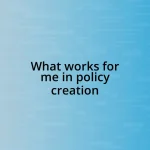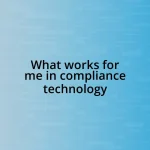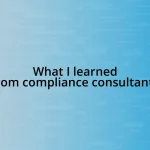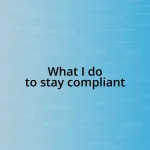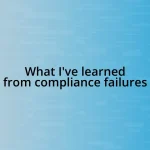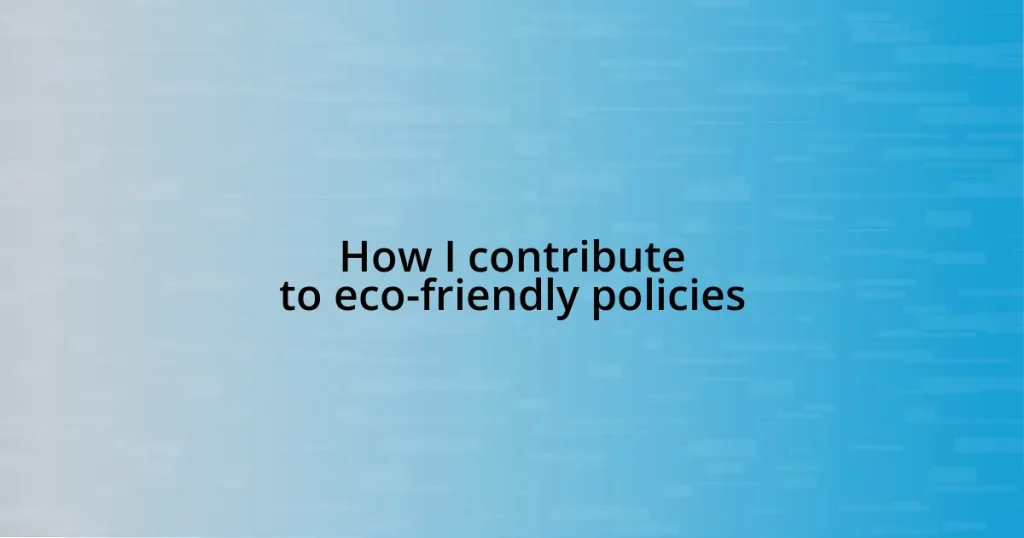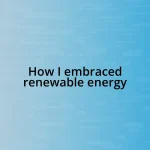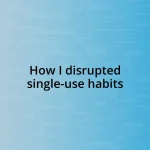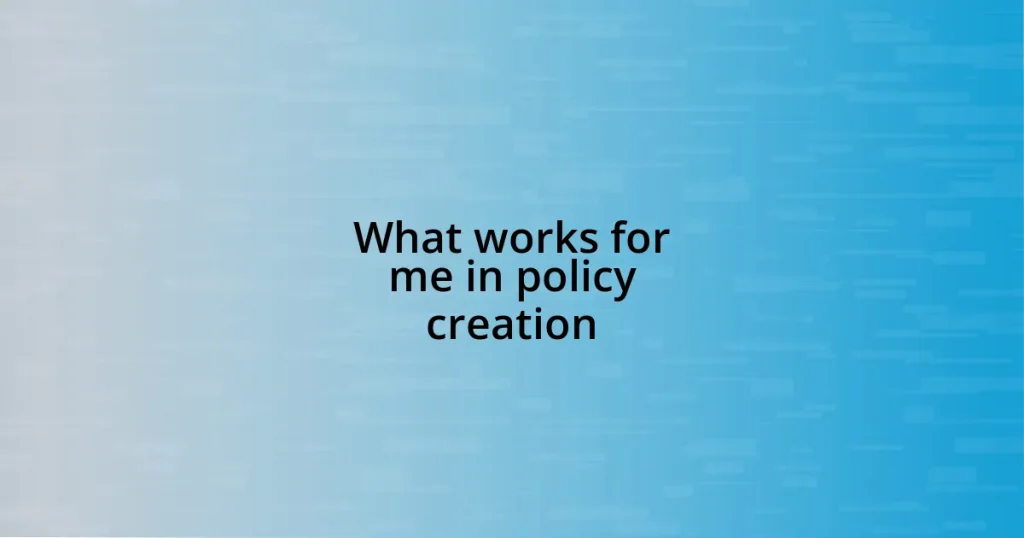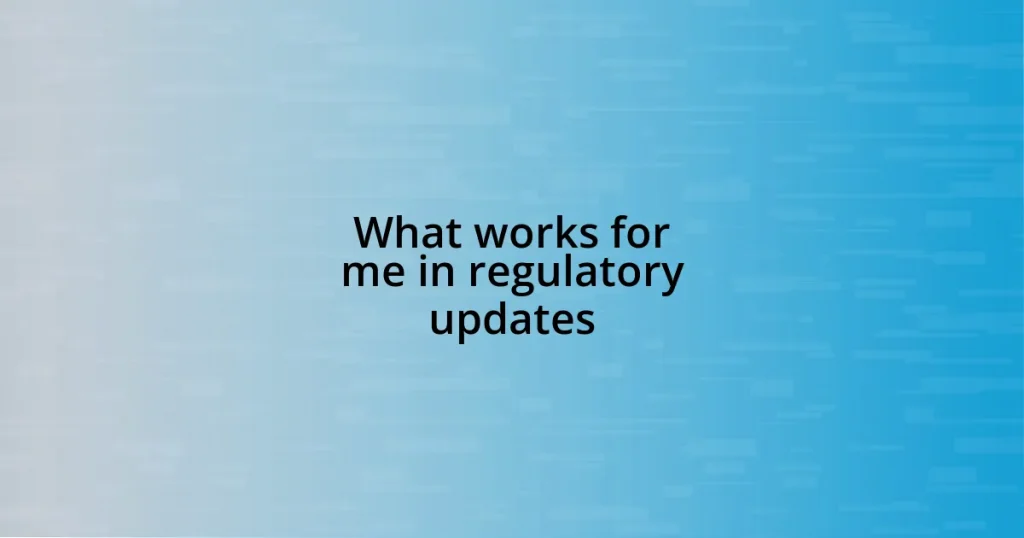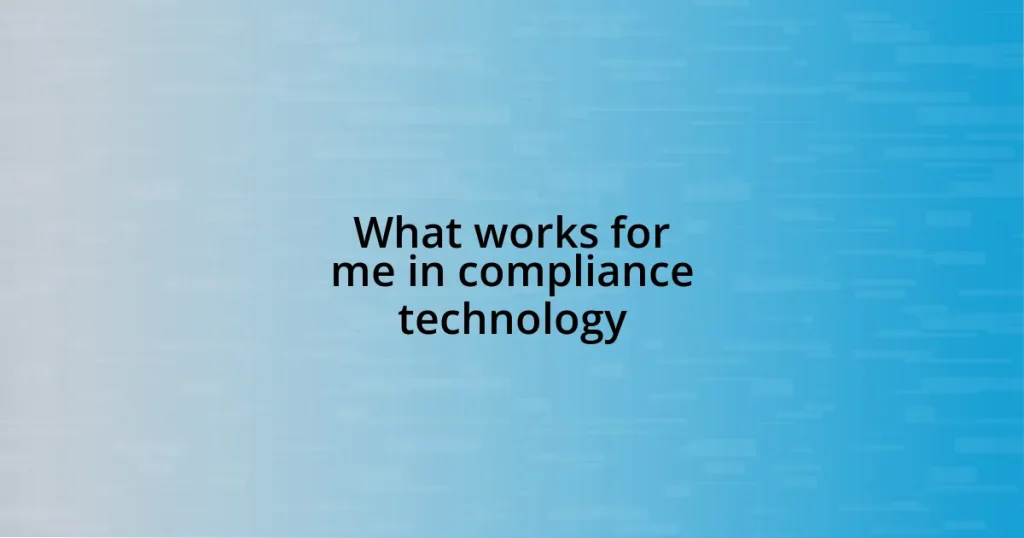Key takeaways:
- Eco-friendly policies create community engagement and emotional connections, as seen in recycling initiatives and town hall meetings.
- Individual actions, like using reusable bags and advocating for sustainable choices, significantly contribute to larger sustainability goals.
- Engaging in community initiatives, such as tree planting and cleanup events, fosters relationships and collaboration while promoting environmental awareness.
- Educating others about sustainability, whether through workshops or social media, inspires collective action and drives meaningful change in communities.
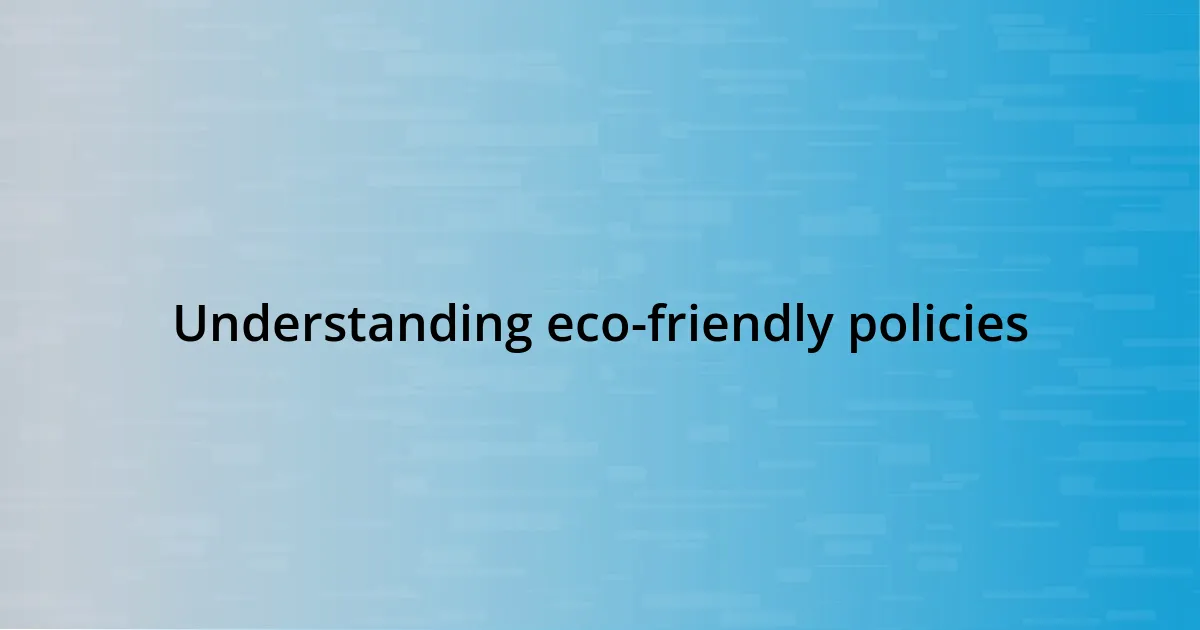
Understanding eco-friendly policies
Eco-friendly policies essentially aim to reduce our environmental impact, promoting practices that can combat climate change and conserve natural resources. I remember when I first began exploring these policies; the complexity of regulations and guidelines felt overwhelming. But, as I dug deeper, I realized these policies are not just rules; they’re essential frameworks designed to guide us toward sustainability.
Have you ever wondered how much a simple policy change can ripple through a community? For instance, when my neighborhood adopted a recycling initiative, I witnessed firsthand how it transformed our local environment. It sparked conversations among neighbors, inspired more people to engage in sustainable practices, and even led to a reduction in waste. This experience underscores the power these policies have not just in our lives but in cultivating a sense of community.
Engagement with eco-friendly policies often feels abstract at first, but they can be incredibly personal and impactful. I still vividly recall attending a town hall meeting focused on energy-efficient building codes. The energy in the room was palpable as residents expressed their hopes for a greener future. This sense of involvement made me realize that eco-friendly policies aren’t just top-down mandates; they’re organic, shaped by the collective voice of people who care about their environment. The emotional connections formed during discussions like these are what drive real change.
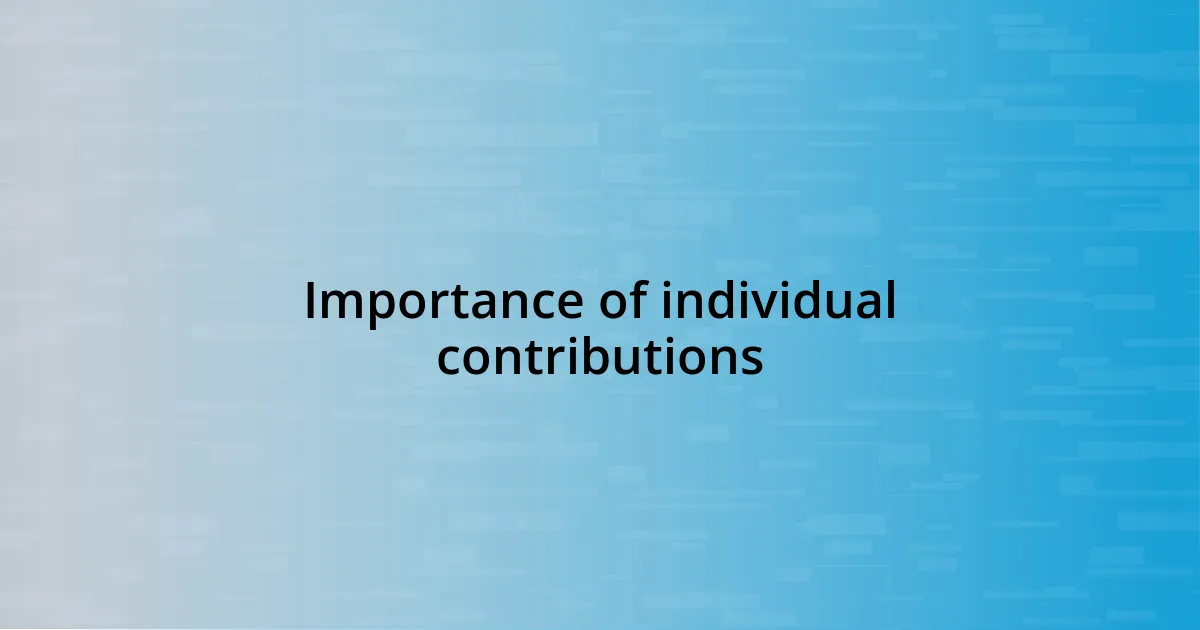
Importance of individual contributions
The strength of eco-friendly policies often lies in the hands of individuals. Each of us has a role to play, and our small actions can accumulate into significant change. I recall the first time I swapped my regular plastic bag for a reusable one. It was a simple choice, yet it sparked conversations with friends about alternatives to single-use plastics. Suddenly, I found myself part of a larger movement, illustrating how individual decisions can resonate beyond our immediate surroundings.
Here are some ways individual contributions make a difference:
- Advocacy: Speaking up about local policies can influence decision-makers and connect with others who share similar values.
- Modeling Behavior: By adopting sustainable practices, like conserving energy at home, I inspire friends and family to rethink their habits.
- Community Engagement: Joining local clean-up events not only beautifies our environment but also fosters a sense of camaraderie and shared responsibility.
- Educating Others: Sharing knowledge about recycling and composting can empower friends to take action and create a ripple effect in our communities.
- Consumer Choices: Opting for environmentally-friendly products sends a message to businesses and encourages them to adopt more sustainable practices.
In my experience, this collective effort reminds me that every choice counts and reinforces the idea that individual contributions are vital to the larger goal of sustainability.
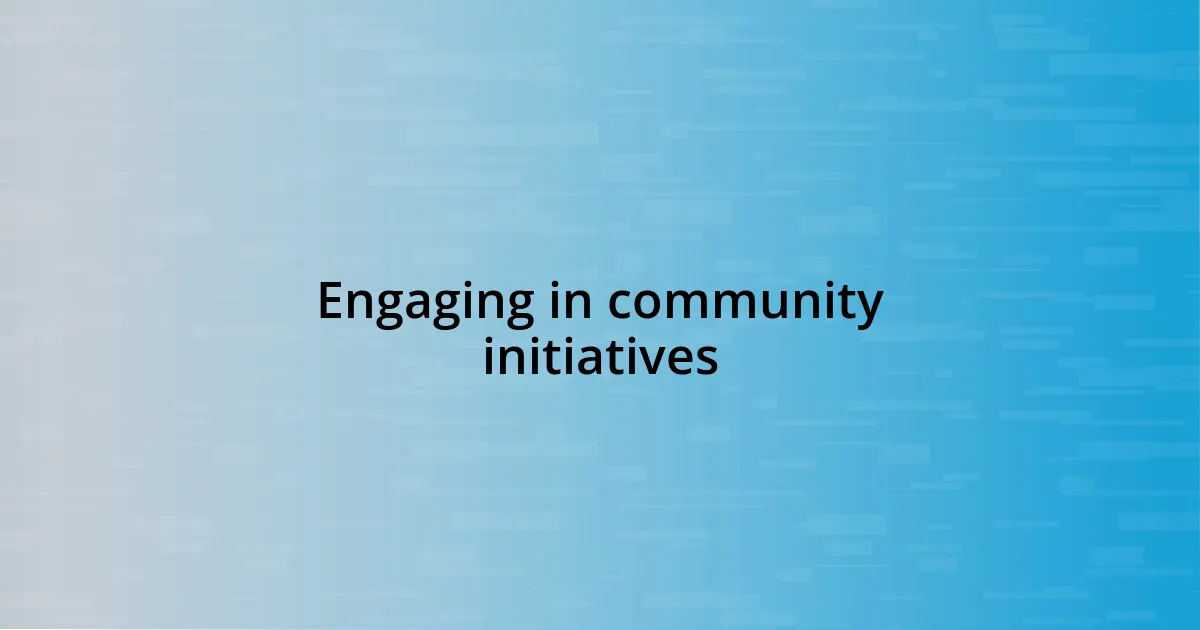
Engaging in community initiatives
Engaging with community initiatives has become one of my favorite ways to contribute to eco-friendly policies. I vividly remember the time our community organized a tree-planting day. The enthusiasm was infectious as families, friends, and even local businesses came together to plant trees in our local park. Witnessing children’s excitement as they nestled young saplings into the ground reminded me of the importance of providing a green legacy for future generations.
One of the most rewarding aspects of participating in these initiatives is the connections I’ve made with like-minded individuals. During a community cleanup event, I found myself chatting with a local artist who used upcycled materials for her sculptures. Our conversation sparked an idea for a collaborative art project that highlighted environmental issues through creativity. When we presented our work during a local festival, it not only raised awareness but also fostered a sense of community spirit. I began to realize that engaging in these initiatives goes beyond just the actions; it builds relationships that strengthen our collective commitment to sustainability.
Finally, I can’t help but reflect on how these engagements open the door to larger conversations. Serving on a local sustainability committee, I’ve seen firsthand how conversations about eco-friendly policies can reflect community values and hopes. Last summer, we tackled the idea of a community garden. I was amazed by the range of ideas that emerged and how each person’s perspective enriched our understanding. It felt powerful to see varied interests converge—food security, biodiversity, and community building—all tied together in one initiative. That experience solidified my belief in the importance of community engagement as a vehicle for change.
| Type of Initiative | Personal Experience |
|---|---|
| Tree-Planting Event | Remembering the joy of families working together, creating a greener space for future generations. |
| Community Cleanup | Bonding with a local artist, leading to a creative project that addressed environmental issues. |
| Sustainability Committee | Engaging in diverse discussions about community gardens, reflecting shared values and collaboration. |
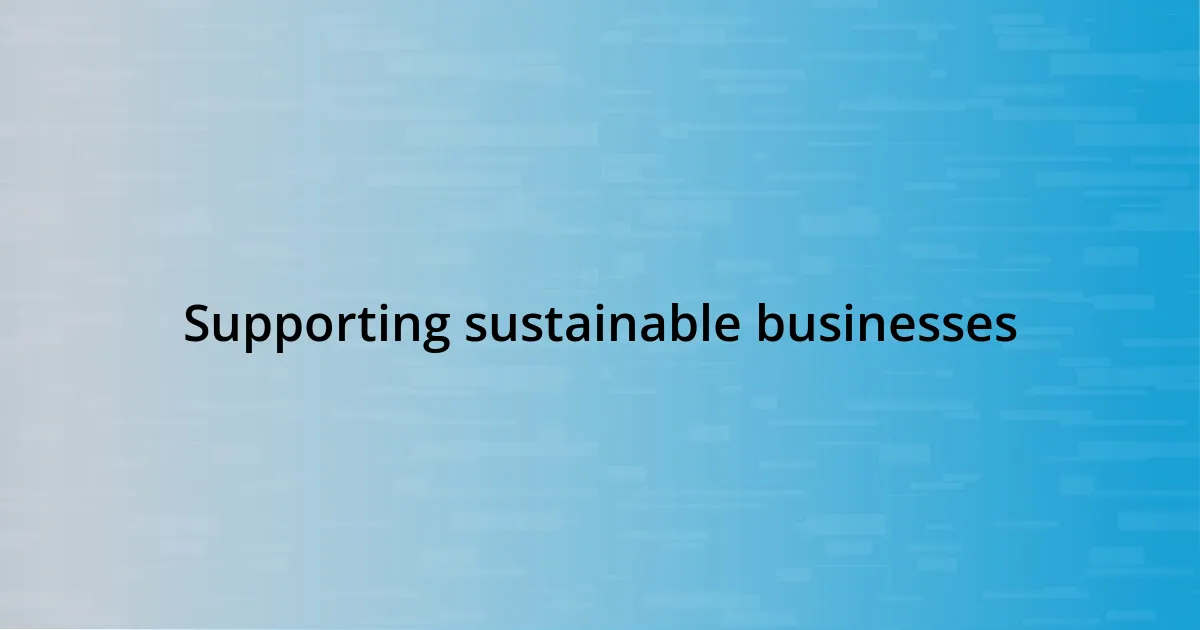
Supporting sustainable businesses
Supporting businesses that prioritize sustainability is something I feel deeply passionate about. Just the other day, I discovered a local café that sources its coffee beans from fair trade suppliers. I can’t tell you how great it felt to sip my morning brew knowing that my choice supported farmers who practice sustainable cultivation. It’s this kind of connection that fuels my enthusiasm for eco-friendly businesses.
Another memorable experience was when I attended a local market showcasing artisans who use recycled materials in their creations. I remember chatting with a woman who crafted stunning jewelry from discarded plastics. Her story about transforming waste into beauty resonated with me—it made me realize how every purchase can tell a story of hope for sustainability. Wouldn’t it be amazing if more people knew about the impact of their shopping choices? That’s why I believe in sharing these experiences and encouraging others to seek out sustainable options.
I often find myself wondering how we can collectively shift industry standards. By consciously supporting businesses that prioritize sustainability, I feel like I’m casting a vote for the kind of future I want to see. The more we demand these practices, the more mainstream they become. Just last week, I came across a clothing brand committed to using organic materials and fair labor practices. I felt an immediate urge to spread the word about them—empowering others to make informed choices brings me a sense of purpose, showing us all that we can be the change we wish to see in the world.
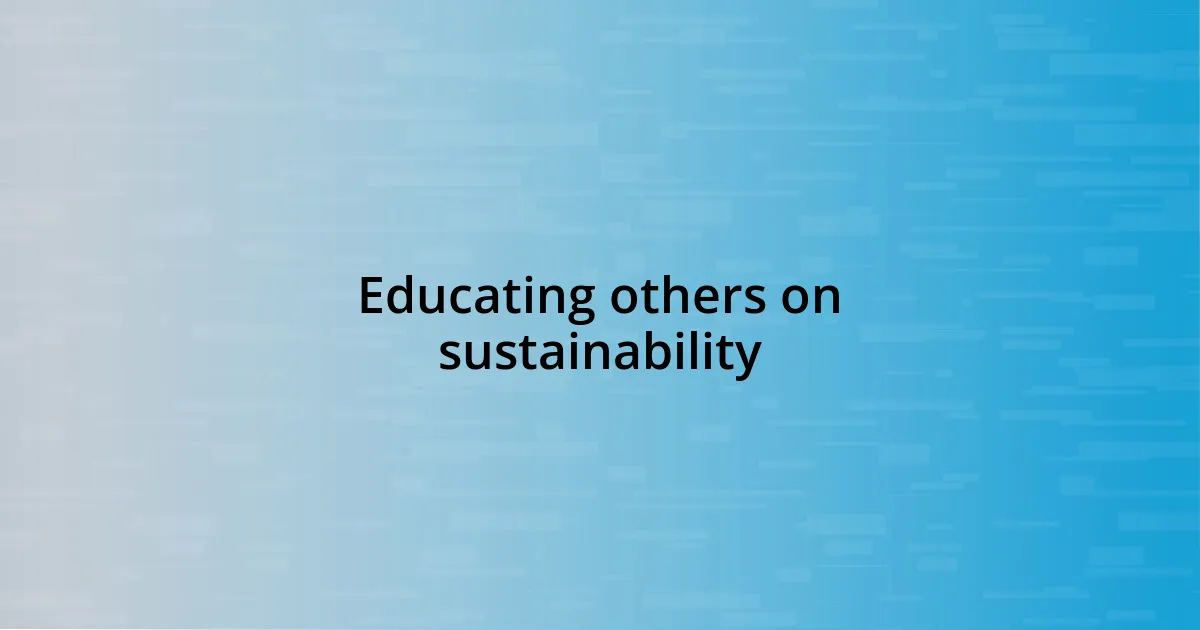
Educating others on sustainability
The journey of educating others on sustainability really resonates with me. Recently, I hosted a small workshop in my neighborhood focused on the importance of reducing plastic waste. As I stood before the group, I shared my own struggles with single-use plastics, from the frustration of finding alternatives to the moment I realized how impactful small changes could be. Seeing nods of understanding and hearing my neighbors share their stories made it clear that we all face similar challenges, and it was inspiring to witness the collective “aha” moments.
Another experience that stands out was volunteering at a local school to teach kids about recycling. Their curious faces lit up as I explained how recycling transforms waste into new products. One little boy, with wide eyes, asked, “Can I turn my old toys into something new?” That question was a beautiful reminder of how eager young minds are to learn and engage with sustainability concepts. I think about how this early education can shape their values and actions for the future, creating a ripple effect that influences their families and friends.
I often ponder: how can we make sustainability engaging and accessible to everyone? Sharing my knowledge through social media has been a successful way for me to connect with a broader audience. I recall a post where I shared my personal journey of switching to zero-waste alternatives. The conversations that followed were enriching. People were curious, sharing their own tips and struggles. Those exchanges reinforced my belief that educating others isn’t just about imparting knowledge; it’s about fostering a community dialogue that inspires action and drives meaningful change.

